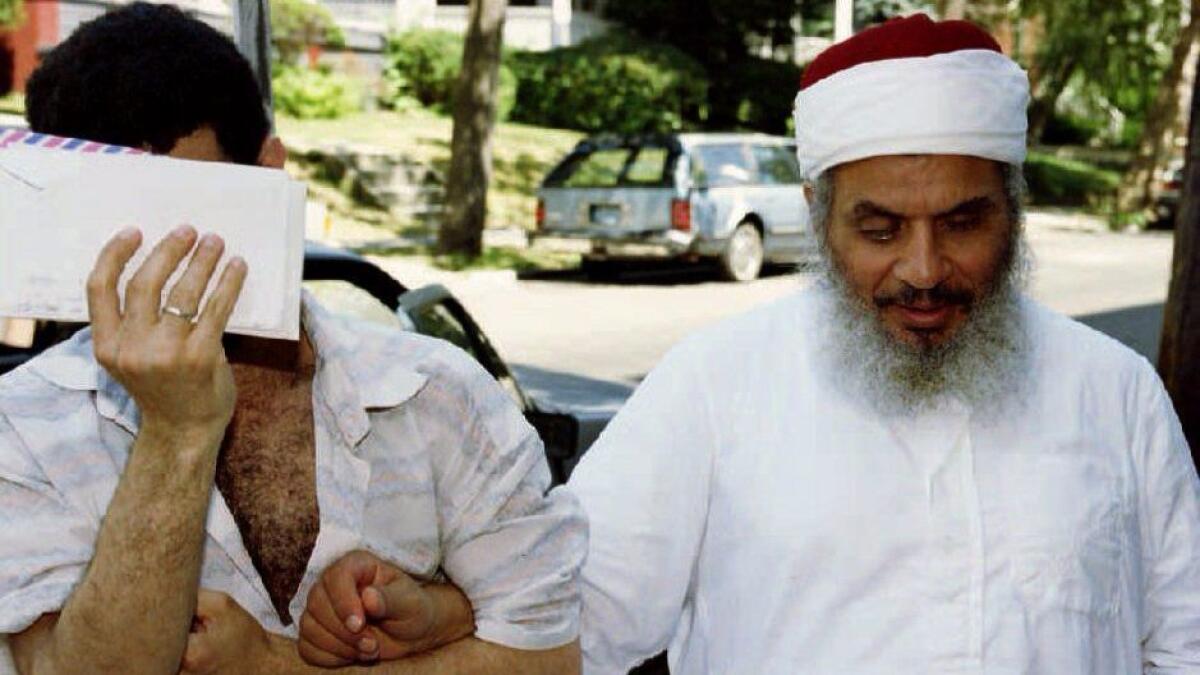Blind cleric imprisoned for conspiring to blow up New York City landmarks has died

- Share via
Reporting from BUTNER, N.C. — Omar Abdul Rahman, the so-called Blind Sheik convicted of plotting terror attacks in the United States in the 1990s, has died. He was 78.
Kenneth McKoy of the Federal Correctional Complex in Butner, N.C., said Abdul Rahman died at 5:40 a.m. He suffered from diabetes and coronary artery disease and had been at the complex for seven years.
Abdul Rahman was a key spiritual leader for a generation of Islamic militants and became a symbol for radicals during a decade in American prisons.
Abdul Rahman, blind since infancy from diabetes, was the leader of one of Egypt’s most feared militant groups, the Gamaa Islamiya, which led a campaign of violence aimed at bringing down former Egyptian President Hosni Mubarak.
Abdul Rahman fled Egypt to the U.S. in 1990 and began teaching in a New Jersey mosque. A circle of his followers were convicted in the Feb. 26, 1993, truck bombing of New York’s World Trade Center that killed six people — eight years before Al Qaeda’s suicide plane hijackers brought the towers down.
Later in 1993, Abdul Rahman was arrested for conspiracy to carry out a string of bombings against the United Nations, the Lincoln and Holland tunnels, the George Washington Bridge and other New York landmarks.
But since his imprisonment, Abdul Rahman’s influence had been seen more as symbolic than that of a practical leader. His Gamaa Islamiya, which led a wave of violence in the 1990s, was crushed a decade ago, and its leaders, jailed in Egypt, declared a truce.
Abdul Rahman’s activities pre-dated Osama bin Laden’s formation of Al Qaeda in the late 1990s. But he was an influential figure in the generation of Islamic extremists that emerged from Egypt over the past two decades.
He attended Cairo’s Al Azhar University, a center of Islamic scholarship, and quickly ran into trouble as he turned toward a “takfir” ideology — a radical interpretation of Islam that holds that those who don’t follow a strict version of Islamic Sharia law are “kafirs” or “infidels.”
After the death of Egyptian President Gamal Abdel Nasser in 1970, he told followers not to pray for the soul of the leader of secular Arab nationalism because he was an infidel. That got him eight months in prison.
Before moving to the U.S., Abdul Rahman traveled to Afghanistan and Pakistan, where he became a spiritual leader for the mujahedeen, then fighting Soviet troops with help from the CIA.
Abdul Rahman arrived in the United States in 1990, even though he was on a list of suspected terrorists and thus banned from the country. He was given permanent residence status under the name Omar Ahmed Ali.
FROM THE ARCHIVE
Cleric Tied to Bomb Suspects Faces Arrest
UPDATES:
1:05 p.m.: This article was updated with additional context and biographical information.
This article was originally published at 10:10 a.m.
More to Read
Sign up for Essential California
The most important California stories and recommendations in your inbox every morning.
You may occasionally receive promotional content from the Los Angeles Times.













